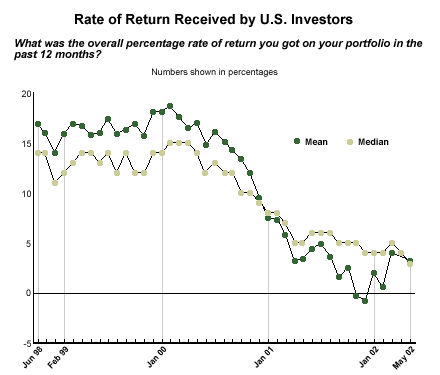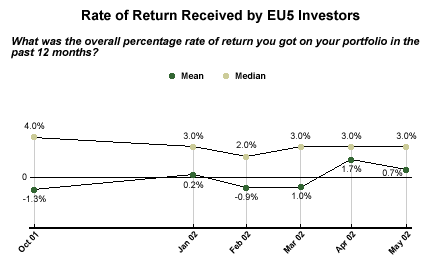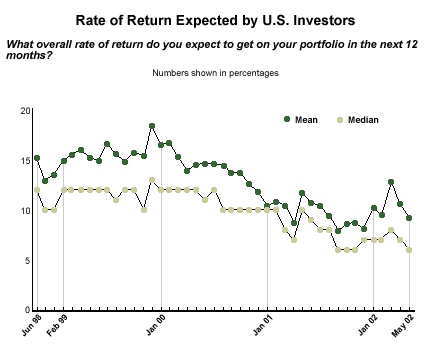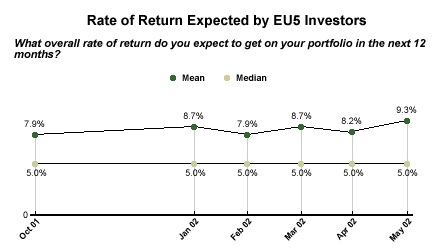Over the past several years, U.S. investors have had optimistic expectations for the stock market. Prior to the recent economic downturn, investors expected the great returns they got in the late 1990s to continue unabated. Unfortunately, the reality has been much different for most investors recently. Instead of double-digit returns, many investors have experienced marginally positive or even negative returns on their portfolios over the past year.
Of course, a strong economic recovery usually brings with it the potential for much higher rates of return. As a result, many on Wall Street have been predicting returns of 20% or more for 2002 based on the assumption that when the much-anticipated recovery builds a full head of steam, the stock market will boom again.
However, new poll data for the Gallup/UBS Index of Investor Optimism -- U.S. (May 1-16)* show that many investors in both the United States and Europe aren't buying the idea of another stock market boom in 2002, and are not counting on terrific stock market returns this year. In May, investors project a median annual expected rate of return for the stock market in both the United States and Europe of only 5%. That is, half of all investors expect the stock market will provide a rate of return of 5% or less over the next 12 months.
Given these expectations, it is little wonder that in May 2002, Gallup recorded the second-lowest percentage ever (59%) with regard to the number of current U.S. investors who say that now is a good time to invest in the financial markets. (The lowest figure since the survey began tracking this sentiment in June 1998 was 53%, observed in September 2001.) An even smaller percentage of current European investors (45%) say that now is a good time to invest in the financial markets. Along these same lines, it is also not surprising that half of all U.S. investors and nearly the same percentage of EU5 investors (47%) say bonds are more promising right now than stocks.
My guess is that the reduced rate-of-return expectations reflected in the May survey are totally justified. Currently, there are many significant threats affecting the investment climate (see "Has the Time Come for Real Reform?" in Related Items). Worse yet, there are few signs of a sharp pick-up in capital spending or real corporate profits.
Rates of Return Have Been Low for More Than a Year
In June 1998, American investors reported that their portfolios had given them a median rate of return of 14% over the previous 12 months. That figure remained at 14% when the same question was asked in May 1999 and May 2000.
Things changed dramatically in May 2001, when investors reported that their median rate of return for the previous year was only 5%. In May 2002, investors reported an even lower median rate of return of 3%.

The Index of Investor Optimism -- EU5 provides a much shorter trending of European investor rate-of-return expectations. Interestingly however, in May 2002, European investors also reported a median rate of return of 3% over the past 12 months.

Investors Are Not Expecting a Lot More This Year
U.S. investors do expect better returns this year. They expect to obtain a median return of 6% on their portfolios over the next 12 months -- double the return they say they got last year.
On the other hand, current rates of return are lower than people expected them to be last year at this time. In May 2001, U.S. investors said they expected a median rate of return of 10% in the next 12 months. Such high expectations only exacerbated the pain associated with the minimal returns most investors have experienced over the last year.

As EU5 investors look forward to the second half of 2002, they also expect to get better rates of return than they did last year -- a median return of 5% over the next 12 months. This is nearly double the return they say they got last year, and similar to the 6% rate of return U.S. investors expect over the next 12 months.

*Results for the Gallup/UBS Index of Investor Optimism -- U.S. poll are based on telephone interviews with a randomly selected national sample of 1,002 adult investors, aged 18 and older, with at least $10,000 of investable assets, conducted May 1-16, 2002. Results for the Index of Investor Optimism -- EU5 are based on interviews with approximately 200 investors each in France, Germany, Great Britain, Italy, and Spain conducted May 1-16, 2002. For results based on a total sample of approximately 1,000 investors, one can say with 95% confidence that the margin of sampling error is ±3%. In addition to sampling error, question wording and practical difficulties in conducting surveys can introduce error or bias into the findings of public opinion polls.
